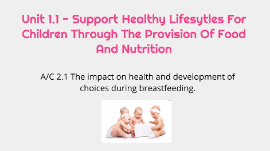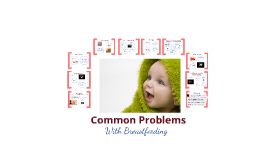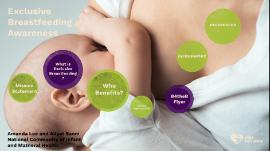Breastfeeding Presentation
Transcript: A/C 2.1 The impact on health and development of choices during breastfeeding. Unit 1.1 - Support Healthy Lifesytles For Children Through The Provision Of Food And Nutrition When breastfeeding, mothers should follow t... When breastfeeding, mothers should follow the principles for the healthy diet in pregnancy. There is no need to eat anything special, just eat healthly. What should be in your diet when breastfeeding? At least five portions of fruit and vegetables a day. This can include fresh, frozen, tinned and dried fruit and vegetables and no more than 150ml glass of unweetened juice. Startchy foods such as wholemeal bread, pasta, rice and potatoes. Plenty of fibre from wholemeal bread, pasta, rice nd cereals. Pulses such as beans and lentils. Fruit and vegetables. Some women may suffer from constipation after childbirth, fibre helps with this. Protein such as lean meat and chicken, fish, eggs, nuts and seeds, soya food and pulses. Two portions of oily fish per week is recommened as they are high in omega 3 fatty acids which is important for the development of the central nervous system. Dairy food such as milk, cheese and yoghurt Do you need to eat more during breastfeeding? It is recommended to have bewteen 300-500 extra calories per day when breastfeeding as you burn more energy. Many mums have an increased hunger and appetite and its not a good idea to restrict your food intake. Do you need to drink more ? It is important to stay hydrated and aim for six-eight glasses of fluids every day. It is a good idea to keep a glass of water beside you when breastfeeding. If your urine is strong and dark in colour, you haven't been drinking enough. Does certain food affect your breast milk? The fat and calories in breast milk tend to come from fat laid down during pregnancy rather then your current diet. However, certain day to day food can effect breast milk for example Omega 3 and Omega 6 fatty acids found in oily fish are good for babies brain development, but these are only found in breast milk if mothers have eaten it in her diet. Breast milk does slightly change in flavour depending on what you've eaten, but this actually helps your baby to develop their sense of taste in preperation for solid food. Babies are generally not bothered by particular food mum's eaten unless there is a family history of sensitivities or allergies. Are vitamin supplements required whilst breastfeeding? The Department of Health recommends that all breastfeeding mothers take a 10mg vitamin D supplement every day. This is important as it helps to regulate the amount of calcium and phosphates in our bodies and helps keep bones and teeth strong and healthy. The main two things to avoid or eat in small quantities is fish and alcohol. Fish contain mercury that can have a negative affect on baby's neurologic development so only two portion per week should be consumed. It is a good idea to limit how much you drink, or avoid all together, as too much alcohol regularly can affect baby's brain development. The occassional drink is unlikely to harm you or baby but it may affect how easily baby feeds. Once alcohol has gone from your bloodstream, it will disappear from your breast milk too. Excessive amounts of coffee and tea should also be avoided as caffine transfers into breast milk. Caffine affects some babies more than others, they can become jittery and caffine is a powerful drug which can affect brain development. Caffine can last for upto around 5 hours, which stays in the body and can take over 24hrs to be eliminated, so more caffine on top of caffine means the effect accumulates. It is a good idea to consume decaffinated tea and coffee. Certain foods may cause irritation, gas or intestinal irritation in babies such as caffine (coffee, tea and chocolate), citrus fruit, spicy peppers, broccoli, onion and garlic. Some herbs such as peppermint and parsley can decrease milk supply. Although peanut allergies are very common, it is safe to eat them when breastfeeding, unless of course you, baby's dad or siblings have a peanut allergy as baby may be at a higher risk of also developing an allergy. Always check with pharmacists or your doctor before taking any type of medication as some may be harmful to baby as it can be passed on through breast milk.

















